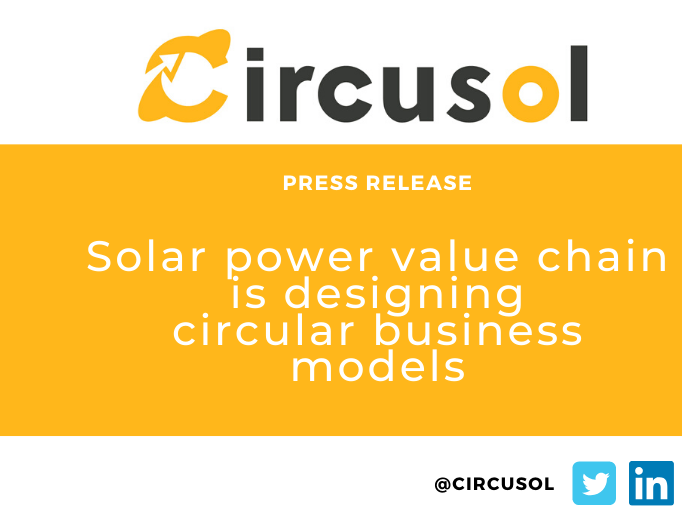Solar power value chain is designing circular business models
Aligned with the EU Green Deal, CIRCUSOL works on the development and the demonstration of Product-Service System (PSS) business models for the solar power sector. The 1st stage of the project has been successfully implemented and now the project enters a crucial demonstration phase. An important focal point of the consortium meeting on 18 February 2020 in Brussels was indeed the development of the demonstrator projects, which aim to implement economically and environmentally feasible product-service models for the solar power industry. CIRCUSOL partners agreed that the use of 2nd life PV panels and 2nd life Lithium-Ion Batteries (LIBs) is key for the value proposition of these circular business models. The sourcing, refurbishment and re-certification of 2nd life PV panels and batteries remains however challenging. CIRCUSOL is working on clear criteria and protocols for the labelling of 2nd life PV modules and LIBs in order to guarantee safety and performance, and build trust in these 2nd life products in the market. The five demonstrator projects under development range from relatively small-scale to community and regional scale. The demonstrator sites are located in Belgium (Futech - Cloverleaf Lummen, Daidalos - Waasland Cohousing Sint-Niklaas and Ecopower), Switzerland (BKW - Wohlen) and Germany (SunCrafter - Berlin & Bochum). Next to the business model design and co-creation, CIRCUSOL started developing a simulation model for the (macro-economic) PV- and LIBs-ecosystems. This model simulates interactions in a complex network of social, economic, legal, technical and environmental aspects. The model will allow policy and decision-makers to assess the effects of certain measures on the development of circular PSS business, and the related market of 2nd life PV panels and LIBs. The CIRCUSOL consortium is led by VITO and comprises partners from all around Europe: Lund University (Sweden), Bern University of Applied Science (Switzerland), IMEC (Belgium), Soli Tek R&D UAB (Lithuania), SNAM (France), CEA Liten (France), Ecopower cvba (Belgium), PV CYCLE a.i.s.b.l. (Belgium), BKW Energie AG (Switzerland), Futech (Belgium), Daidalos Peutz (Belgium), ZABALA Innovation Consulting (Spain), SunCrafter (Germany) and Loser Chemie GmbH (Germany) whose assets were recently bought by a new company named LuxChemtech. Prior to the consortium meeting, a cluster event by EASME brought a great opportunity to get in contact with similar projects of the sector, share experiences and identify synergies and collaboration opportunities. To reach different stakeholders at the national level, the CIRCUSOL website is – in addition to English – also available in French, Dutch, and German.



